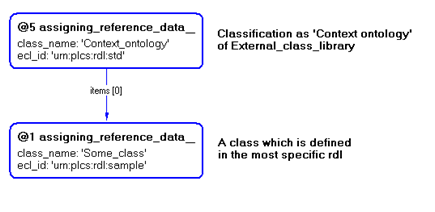
| Capability (C010):— assigning_reference_data | Date: 2007/06/22 12:22:09 Revision: 1.23 |
 Issue:
GYL-9 by Rob Bodington (07-04-13) minor_technical issue
Issue:
GYL-9 by Rob Bodington (07-04-13) minor_technical issue
 Issue:
GYL-8 by Leif Gyllstrom (05-10-20) minor_technical issue
Issue:
GYL-8 by Leif Gyllstrom (05-10-20) minor_technical issue Comment: (Peter Bergström 2007-05-04)
If a leaf class can also be one of the Express entities, I would say yes (however, that might have to be made clear in the text here). All reference data must always a subclass of something in the AP239 schema.
 Issue:
RBN-7 by Rob Bodington (05-10-25) minor_technical issue
Issue:
RBN-7 by Rob Bodington (05-10-25) minor_technical issue
 Issue:
PBM-3 by Peter Bergström (2007-01-31) minor_technical issue
Issue:
PBM-3 by Peter Bergström (2007-01-31) minor_technical issue In order to process OWL correctly, the reference data library that is the most specialized rdl must be identified as the context ontology. The context ontology must include all other rdl's in an exchange file. This should be achieved by classifying the most specialized External_data_library as the "Context_ontology".

This template should describe how to achieve this, both in text and using an instance example. An OWL class "Context_ontology" has to be created. Possibly, a specific template has to be developed for this.
Comment: (Leif Gyllstrom 07-04-23)
This issue has been moved from the template 'assigning_reference_data', since the context ontology should only be refered to once within a message. However, the usage of context ontology should also be mentioned within the assigning_reference_data capability.
Comment: (Peter Bergström 2007-05-04)
Any External_class_library entity representing a specific, identified RDL should only be instantiated once in a data set (although there is currently no uniqueness constraint in the template to that effect, which I think is incorrect, see issue PBM-3 for template assigning_reference_data). That fact makes this capability just the correct place to do it. What would be a better place?
 Issue:
PBM-4 by Peter Bergström (2007-05-04) minor_technical issue
Issue:
PBM-4 by Peter Bergström (2007-05-04) minor_technical issue
 Issue:
TJT-1 by Tim Turner (05-04-11) minor_technical issue
Issue:
TJT-1 by Tim Turner (05-04-11) minor_technical issue Comment: (Leif Gyllstrom 05-06-13)
Version 1.9 is reset to the content of version 1.6
 Issue:
GYL-1 by Leif Gyllstrom (05-06-13) minor_technical issue
Issue:
GYL-1 by Leif Gyllstrom (05-06-13) minor_technical issue Comment: (Leif Gyllstrom 05-06-13)
Done
 Issue:
GYL-2 by Leif Gyllstrom (05-06-13) minor_technical issue
Issue:
GYL-2 by Leif Gyllstrom (05-06-13) minor_technical issue Comment: (Leif Gyllstrom 05-06-23)
Done
 Issue:
GYL-3 by Leif Gyllstrom (05-06-13) minor_technical issue
Issue:
GYL-3 by Leif Gyllstrom (05-06-13) minor_technical issue Comment: (Leif Gyllstrom 05-06-23)
Done
 Issue:
GYL-4 by Leif Gyllstrom (05-06-13) minor_technical issue
Issue:
GYL-4 by Leif Gyllstrom (05-06-13) minor_technical issue Comment: (Leif Gyllstrom 05-10-06)
Removed the usage of Attribute classification as the means of controlling standard values. Added a section under Additional usage guidance.
 Issue:
GYL-5 by Leif Gyllstrom (05-06-13) minor_technical issue
Issue:
GYL-5 by Leif Gyllstrom (05-06-13) minor_technical issue Comment: (Leif Gyllstrom 05-10-06)
Done
 Issue:
GYL-6 by Leif Gyllstrom (05-10-06) minor_technical issue
Issue:
GYL-6 by Leif Gyllstrom (05-10-06) minor_technical issue Comment: (Leif Gyllstrom 05-10-06)
Added information about 15926 and PartsLib.
 Issue:
RBN-1 by Rob Bodington (04-08-18) minor_technical issue
Issue:
RBN-1 by Rob Bodington (04-08-18) minor_technical issue Comment: (Leif Gyllstrom 05-06-23)
Added in both textual description and in the template.
 Issue:
RBN-2 by Rob Bodington (04-09-03) minor_technical issue
Issue:
RBN-2 by Rob Bodington (04-09-03) minor_technical issue Comment: (Leif Gyllstrom 05-06-23)
All figures replaced
 Issue:
RBN-3 by Rob Bodington (04-11-24) minor_technical issue
Issue:
RBN-3 by Rob Bodington (04-11-24) minor_technical issue Comment: (Leif Gyllstrom 05-06-23)
Added section under Additional usage guidance. However, recommendation is to use PLCS standard class 'Unknown'
 Issue:
RBN-4 by Rob Bodington (04-11-09) minor_technical issue
Issue:
RBN-4 by Rob Bodington (04-11-09) minor_technical issue Comment: (Leif Gyllstrom 05-06-23)
Added section under Additional usage guidance
 Issue:
RBN-5 by Rob Bodington (05-07-08) minor_technical issue
Issue:
RBN-5 by Rob Bodington (05-07-08) minor_technical issue Figure 5 in assigning_reference_data template shows Class.description="/IGNORE" and External_class_library.description="$" They should be consistent.
The following attribute values are permitted:
Based on this, the following attributes should be set: External_class_library.description="$" Class.description="$"
Comment: (Leif Gyllstrom 05-09-21)
Rejected. Guidelines for populating non-used attributes has changed in accordance with the approach used in the figure.
 Issue:
RBN-6 by Rob Bodington (05-10-02) minor_technical issue
Issue:
RBN-6 by Rob Bodington (05-10-02) minor_technical issue Comment: (Leif Gyllstrom 05-10-03)
This is provided by the template assigning_business_specific_reference_data.
 Issue:
GYL-7 by Leif Gyllstrom (05-10-04) minor_technical issue
Issue:
GYL-7 by Leif Gyllstrom (05-10-04) minor_technical issue Comment: (Leif Gyllstrom 05-10-04)
Added
 Issue:
RBN-8 by Rob Bodington (06-01-17) minor_technical issue
Issue:
RBN-8 by Rob Bodington (06-01-17) minor_technical issue Comment: (Rob Bodington 06-01-17)
Corrected
 Issue:
RBN-9 by Rob Bodington (06-01-17) minor_technical issue
Issue:
RBN-9 by Rob Bodington (06-01-17) minor_technical issue Comment: (Leif Gyllstrom 2007-05-03)
The figures being adressed belongs to a template that has been deprecated.
 Issue:
RBN-10 by Rob Bodington (06-01-19) minor_technical issue
Issue:
RBN-10 by Rob Bodington (06-01-19) minor_technical issue Comment: (Rob Bodington 06-01-19)
Corrected
 Issue:
PBM-1 by Peter Bergström (06-12-04) minor_technical issue
Issue:
PBM-1 by Peter Bergström (06-12-04) minor_technical issue Comment: (Leif Gyllstrom 2007-05-03)
The mentioned inconcistensy only appears in the template that has been deprecated.
 Issue:
PBM-2 by Peter Bergström (06-12-04) minor_technical issue
Issue:
PBM-2 by Peter Bergström (06-12-04) minor_technical issue Comment: (Leif Gyllstrom 2007-05-03)
The mentioned inconcistensy only appears in the template that has been deprecated.